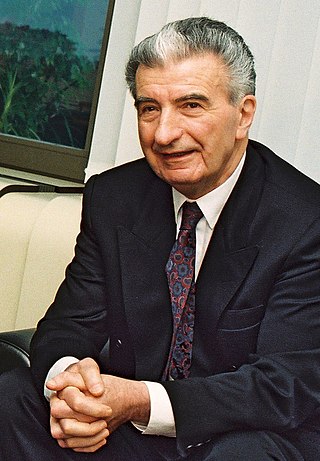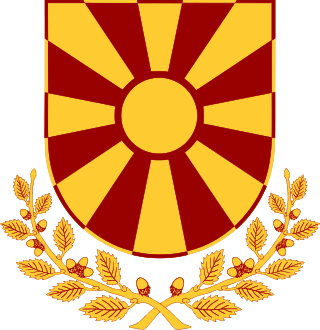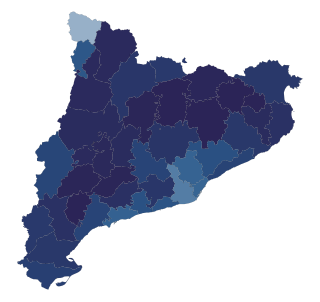The history of North Macedonia encompasses the history of the territory of the modern state of North Macedonia.

Yugoslavia was a country in Southeast and Central Europe that existed from 1918 to 1992.

Kiro Gligorov was a Macedonian politician who served as the first president of the Republic of Macedonia from 1991 to 1999. He was born and raised in Štip, where he was also educated. He continued his education in Skopje and graduated in law in Belgrade. During World War II in Yugoslav Macedonia, he worked as a lawyer and participated in the partisan resistance. By the end of the war, he was an organiser of the Anti-fascist Assembly for the National Liberation of Macedonia, the predecessor of the Socialist Republic of Macedonia as a federal Yugoslav state.

The Internal Macedonian Revolutionary Organization – Democratic Party for Macedonian National Unity, often simplified as VMRO-DPMNE, is a conservative political party in North Macedonia and is the main centre-right to right-wing party in the country.

The Internal Macedonian Revolutionary Organization, was a secret revolutionary society founded in the Ottoman territories in Europe, that operated in the late 19th and early 20th centuries.

The Socialist Republic of Macedonia, or SR Macedonia, commonly referred to as Socialist Macedonia, Yugoslav Macedonia or simply Macedonia, was one of the six constituent republics of the post-World War II Socialist Federal Republic of Yugoslavia, and a nation state of the Macedonians. After the transition of the political system to parliamentary democracy in 1990, the Republic changed its official name to Republic of Macedonia in 1991, and with the beginning of the breakup of Yugoslavia, it declared itself an independent country and held a referendum on 8 September 1991 on which a sovereign and independent state of Macedonia, with a right to enter into any alliance with sovereign states of Yugoslavia was approved.

The President of the Republic of North Macedonia is the head of state of North Macedonia.

Ivan Mihaylov Gavrilov, known also by his short name as Vancho Mihaylov, was a Bulgarian revolutionary in interwar Macedonia, and the last leader of the Internal Macedonian Revolutionary Organization (IMRO).

After a period of political and economic crisis in the 1980s, the constituent republics of the Socialist Federal Republic of Yugoslavia split apart, but the unresolved issues caused a series of inter-ethnic Yugoslav Wars. The wars primarily affected Bosnia and Herzegovina, neighbouring parts of Croatia and, some years later, Kosovo.
The Anti-fascist Assembly for the National Liberation of Macedonia was the supreme legislative and executive people's representative body of the communist Macedonian state from August 1944 until the end of World War II. The body was set up by the Macedonian Partisans during the final stages of the World War II in Yugoslav Macedonia. That occurred clandestinely in August 1944, in the Bulgarian occupation zone of Yugoslavia. Simultaneously another state was declared by pro-Nazi Germany Macedonian right-wing nationalists.
The Arbitration Commission of the Conference on Yugoslavia was an arbitration body set up by the Council of Ministers of the European Economic Community (EEC) on 27 August 1991 to provide the conference on Yugoslavia with legal advice. Robert Badinter was appointed to President of the five-member Commission consisting of presidents of Constitutional Courts in the EEC. The Arbitration Commission has handed down fifteen opinions on "major legal questions" raised by the conflict between several republics of the Socialist Federal Republic of Yugoslavia (SFRY).

World War II in Yugoslav Macedonia started with the Axis invasion of Yugoslavia in April 1941. Under the pressure of the Yugoslav Partisan movement, part of the Macedonian communists began in October 1941 a political and military campaign to resist the occupation of Vardar Macedonia. Officially, the area was called then Vardar Banovina, because the very name Macedonia was prohibited in the Kingdom of Yugoslavia. It was occupied mostly by Bulgarian, but also by German, Italian, and Albanian forces.

The Independent State of Macedonia was a proposed puppet state of Nazi Germany during the Second World War in the territory of the Kingdom of Yugoslavia that had been occupied by the Kingdom of Bulgaria following the invasion of Yugoslavia in April 1941.
The World Macedonian Congress is a Macedonian diaspora organization based in Skopje. It presents itself as an organization fighting and demanding for more human rights to ethnic Macedonians on an international level, but is seen as a nationalist or ultranationalist organization by researchers. The organization was registered during the fall of communism, on 15 September 1990 by Todor Petrov, who is also the president of the organization.
Independence Day in North Macedonia is celebrated on 8 September. It has been a national holiday since 1991, when, following a referendum for Independence, SR Macedonia gained its independence from Yugoslavia, where it was a federal state, and became a sovereign parliamentary democracy.

Both Montenegro and the Republic of North Macedonia are full members of the Council of Europe and of the NATO. The Foreign Ministry of North Macedonia states the two countries have excellent political ties, without any open issues between the two countries. The embassy of North Macedonia to Montenegro is located in the capital city of Podgorica. Montenegro's embassy in North Macedonia is also located in the country's capital city, which is Skopje. Also, Montenegro has an honorary consulate in the city of Bitola.

Independent Macedonia was a conceptual project of the Internal Macedonian Revolutionary Organization (IMRO) to create an independent Macedonia, during the interwar period.
An independence referendum was held in Bosnia and Herzegovina between 29 February and 1 March 1992, following the first free elections of 1990 and the rise of ethnic tensions that eventually led to the breakup of Yugoslavia. Independence was strongly favored by Bosniak and Bosnian Croat voters while Bosnian Serbs boycotted the referendum or were prevented from participating by Bosnian Serb authorities.

A non-binding Catalan self-determination referendum, also known as the Citizen Participation Process on the Political Future of Catalonia, was held on Sunday, 9 November 2014, to gauge support on the political future of Catalonia. While also referred to as "Catalan independence referendum", the vote was rebranded as a "participation process" by the Government of Catalonia, after a "non-referendum popular consultation" on the same topic and for the same date had been suspended by the Constitutional Court of Spain.

The Dayton Agreement ended the Bosnian War and created the federal republic of Bosnia and Herzegovina (BiH), which consists of the Bosniak and Croat-inhabited Federation of Bosnia and Herzegovina (FBiH) and the Serb-inhabited Republika Srpska (RS). Although the Bosnian Serbs were viewed as "anti-Dayton" during the first years after the war, since 2000 they have been staunch supporters of the Dayton Agreement and the preservation of RS. Bosniaks generally view RS as illegitimate, and an independence referendum from BiH has been proposed in RS. The 2006 Montenegrin independence referendum and Kosovo's 2008 declaration of independence have raised the possibility of a referendum and unification with Serbia. In 2015, after a judicial and police crisis, the governing Alliance of Independent Social Democrats said that it would hold an independence referendum in 2018 if RS's autonomy was not preserved.














